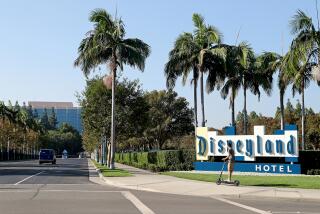Judge Doubts Pooh Evidence
- Share via
Walt Disney Co. on Tuesday tried to shoot holes in the “lone dumpster defense” in the long-running Winnie the Pooh royalties lawsuit, but the judge overseeing the case said the Burbank entertainment giant lacked solid evidence that “garbage documents” came from more than one location.
Los Angeles County Superior Court Judge Charles W. McCoy told Disney that the firm lacked “physical proof” that the documents -- internal memos, revenue reports and contract summaries -- came from locations other than the dumpsters identified by a man who was hired to dig through Disney’s trash.
Much is at stake in the 13-year-old breach-of-contract lawsuit; Disney has said losing it could cost the company “several hundred million dollars.”
Disney’s lead attorney, Daniel Petrocelli, argued that the judge should dismiss the lawsuit. Petrocelli said it was preposterous that important papers would have found their way into the garbage behind a satellite office building a few blocks from Disney’s headquarters.
“Their whole story does not hold together,” Petrocelli said.
The judge did not indicate when he might rule on Disney’s request to terminate the lawsuit. If the judge rules that the case can proceed, a trial could begin in January 2005.
However, the judge spent much of the afternoon questioning lawyers representing the plaintiffs, Patricia Slesinger and her 82-year-old mother, Shirley Slesinger Lasswell. The judge appeared particularly concerned about alleged alterations to some of the documents.
Disney’s legal team maintains that someone from the Slesinger camp altered or concealed pages that were marked “confidential” and “privileged” as a coverup because they were not supposed to have such private papers.
Slesinger and her attorneys denied the allegation.
Slesinger and her mother sued Disney in 1991, alleging the company had cheated them out of millions of dollars in royalties from Winnie the Pooh computer software, videocassettes, DVDs and other products. They also accuse Disney of not paying royalties on merchandise with several characters, including Pooh.
They inherited the Pooh merchandising rights from Stephen Slesinger, a New York literary agent who acquired them in 1930 from A.A. Milne, the British author who created the pudgy bear. Slesinger died in 1953, and his widow, Lasswell, transferred the rights to Disney in 1961.
The Slesingers and their attorneys contend the documents prove that Disney failed to pay family members all of the royalties they were due.
Disney’s strategy during the hearing was to raise questions about the credibility of key participants, including Slesinger and her husband, David Bentson.
The hearing’s most dramatic moment came last week during Bentson’s testimony. Petrocelli played a tape of a message on the answering machine of a former high-ranking Disney executive about 18 months ago. The caller, which Petrocelli suggested was Bentson, tried to enlist the former executive to help the Slesingers’ efforts, saying the person could “make a lot of money.”
Bentson denied that he made the call, and the judge refused to admit the tape into evidence.
After the hearing concluded Tuesday, Patricia Slesinger said she had had enough of Disney’s legal tactics. Standing outside McCoy’s courtroom, a visibly angry Slesinger said she and her mother would channel their legal efforts to terminating the open-ended rights they gave to Disney. If successful, she said, the family could then turn to another entertainment company, such as Pixar Animation Studios.
“We’re going to just terminate our contract and get our rights back,” Slesinger said. “Pooh doesn’t need Disney as much as Disney needs Pooh.”
More to Read
The biggest entertainment stories
Get our big stories about Hollywood, film, television, music, arts, culture and more right in your inbox as soon as they publish.
You may occasionally receive promotional content from the Los Angeles Times.











